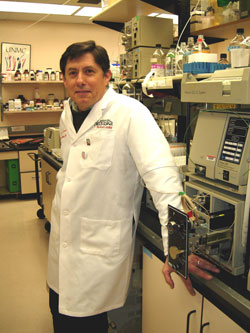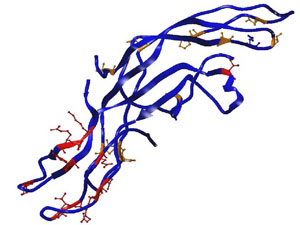 |
Elliott Bedows, Ph.D., in his lab. Dr. Bedows has discovered a revolutionary way to purify recombinant proteins. |
While studying a hormone involved in pregnancy that also is detected in some cancers, UNMC’s Elliott Bedows, Ph.D., and Jason Wilken, Ph.D., discovered something so exciting and potentially profitable that it changed the course of their research.
During experiments on the hormone — called human chorionic gonadotropin (hCG) — they stumbled unwittingly on what could be a revolutionary way to purify recombinant proteins.
Recombinant proteins are natural proteins that are artificially replicated in large quantities to be used in commercial industry, drug development, research and in diagnostic applications.
|
Dr. Bedows explained that human or swine hormones typically have been used to stimulate ovulation, however, there are detrimental side effects because the biological makeup of the hormones is different than tiger hormones. “The human and swine hormones work fine at first, but because they’re so different at the chemical level, ultimately you will get an immunologic response, develop antibodies and the tigers sometimes end up sterilized,” Dr. Bedows said. “We are building new tiger hormones and purifying them in high enough quantities so the zoo can start using tiger hormones for in vitro fertilization and assisted reproductive techniques. What they get is a tiger hormone that is so pure that the tiger recognizes the hormone as its own, thereby avoiding potential side effects.” |
Dr. Bedows’ protein purification process will be on display next week during the Biotechnology Industry Organization (BIO) Convention in Boston.
Recombinant protein purification currently is a $36 billion a year industry and applications for protein purification technologies are vast.
Those working with the researchers say Dr. Bedows’ revolutionary technology has the potential to attract industry with its capability of purifying proteins with high yield and high purity at a very low cost. It already has attracted one company.
Allied Minds, a Boston-area pre-seed investment company that provides funds for successful early stage technology, has purchased the technology license and formed Purtein LLC. Last November, Allied Minds invested $500,000 in Purtein.
The company was scouting the Midwest for hot technologies, when Tom McDonald, Ph.D., presented Dr. Bedows’ technology to Christopher Silva, chief executive officer of Allied Minds.
“Six months went by, then one day the company called and expressed interest in the technology,” said Dr. McDonald, who at the time was working for UNMC marketing and licencing arm, UNeMed, and now is director of UNMC’s Technology Advancement Group (TAG).
James Linder, M.D., president of UNeMed, said the venture with Allied Minds is an exciting one.
“We see the partnership as a fast, effective way to commercialize this novel technology,” Dr. Linder said. “This technology has very broad applications to help companies or those with research interests get their job done. It can be used to make many products better.”
Dr. McDonald, who is principal investigator for Purtein-sponsored research, said most new drug discoveries will be based on recombinant protein technology.
“All companies that are looking at drug targeting will need many different kinds and large quantities of purified proteins and their derivatives,” Dr. McDonald said.
Silva, CEO of Purtein, said the protein purification technology will reduce both direct costs of chemicals required, as well as the indirect costs associated with the complexity and time required under current purification processes.
“Purtein expects to reduce these production costs dramatically,” Silva said. “The preparation of commercial products such as enzymes or nutritional proteins, or certain biopharmaceuticals, will benefit from this technology.”
Human insulin for treatment of diabetes is one example of a recombinant protein. When drug companies need to make a vaccine, they need a pure protein. If a food additive you want to put in a cereal grows in a potato, the additive is taken out of the potato and purified by protein purification technology.
 |
Shown are the molecules hCG and mCG, superimposed, which UNMC researchers Elliott Bedows, Ph.D., and Jason Wilken, Ph.D., were studying when they developed their novel purification technology. |
Since his technology was licensed to Purtein, Dr. Bedows finds himself engaged in conversations with patent attorneys, marketing professionals and venture capitalists, when what he really would rather be doing is talking to other scientists about experiments.
“It turns out, much to my chagrin, that the technology to advance our research was more valuable that the research itself — that is to say we got more funding for the technique than for the actual data that we were producing,” Dr. Bedows said.